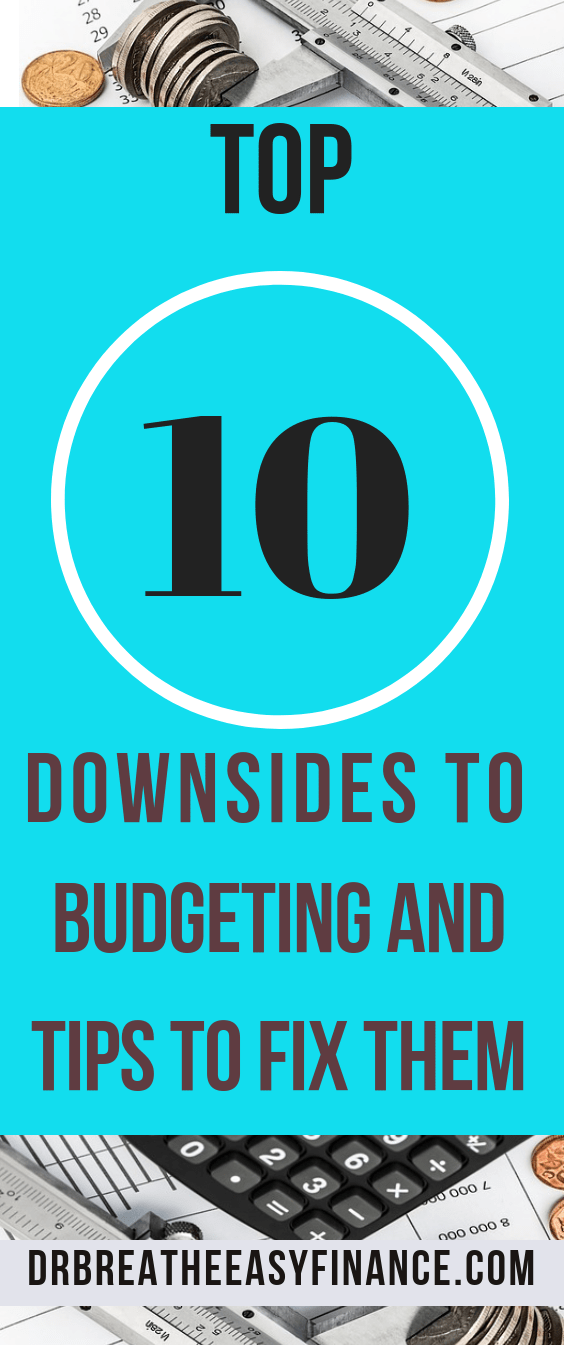10 Downsides Of Budgeting And Ways To Fix Them. Mrs Breathe Easy Finance
Which of the following is not a benefit of budgeting? That was an actual quiz question on Google which stated multiple benefits of budgeting and singled out one limitation.
Are there limitations to budgeting? Absolutely! After coming across this search on Google, it triggered me to think about if there are indeed any downsides to budgeting or if budgeting is even right for everyone. There are plenty of minimalist, who live debt free, on the pure principle of spend less and save more, without committing to a budget. Yet, they seem to do well financially.
Since, we have published multiple articles discussing budgeting, it’s only fitting for us to acknowledge the possible downsides of budgeting as well. This is only fair.
According to US bank, only 41% of Americans keep track of their finances in an organized fashion which is also known as a budget. Why are the remaining 59% resistant to budgeting?
Let’s talk about it. Comment below with your opinions.

10 limitations to budgeting
Table of Contents
1. Budgeting can be time consuming
Budgeting takes time, especially if you haven’t found an efficient method, such as a popular app to streamline the process. Not only do we have to come up with an overall budget and categorize our expenses, we most often have to make corrections to our budget. This is especially true in the initial stages of starting a budgeting. You are almost certain to make several changes throughout the month that you overlooked.
In our family, we have a monthly family financial meeting. It includes discussing our overall budget goals and the reviewing the aspects where we still need improvement. This is also an opportunity to voice any concerns for the upcoming budget. A good approach is coming up with a logical format that is productive for your family . We vaguely use personal capital to track our expenses. I’m going to make the assumption that time is a major factor as to why 59% of Americans do not budget.

If time travel were possible, you can travel back in time to undo your financial mistakes.
2. Budgets are usually inaccurate
As much as we try to cross our “I”s and dot our “T”s. Dr BEF is mathematician, so the obsession to always want the numbers to correctly align is impulsive. However, we have come close, but have never hit the exact number we project for our budget. Most months we are a little over or under our set number.
In budgeting, there can be so many unforeseen variables. For this very reason, we have resorted to the “reverse budgeting” technique. We still have the brick and mortar budget but with a little leeway. We invest a percentage of our money and the rest remain in our joint account for our budget. The remaining amount at the end of the every month serves as secondary emergency fund.
Budgets can be grossly inaccurate because it is based on a lot of assumptions. A friend asked me for budgeting advice. She was growing increasingly frustrated with her ever changing budget. There were just too many variables that changed every month. It made it difficult to have a consistent budget. A simple example was her gas budget.
Depending on her kid’s activities for the month, her gas budget changed frequently. If her children played sports out of state in a particular month, her gas budget dramatically increase. I encouraged her to try the reverse budgeting approach or to create a miscellaneous category to give her the extra cushion her budget required.
Similarly to my friend, there are many people that aren’t attracted to budgeting because their lifestyle, monthly income and spending can vary greatly from month to month. It takes discipline and some organizational skills to constantly update and edit changes to a monthly budget.
Here is how to create a good budget to get you started.

These numbers are not adding up. Help!!
3. Crash Budgeting – Crash and burn
Crash budgeting is the sister of crash dieting. You get fed up with your unhealthy eating habits or your weight and you vow to do something about it. Rather than incorporating a healthier diet gradually. You go on an extremely restrictive diet overnight. Most people are unable to sustain such a dramatic change and therefore after a couple of weeks, they naturally revert back to their unhealthy eating habits, even gaining additional weight. Slow and steady is a better recipe for effective change.
With crash budgeting, many people get fed up of their frivolous spending and undisciplined financial practices. People are often frightened by their inability to even recall exactly where their money went. They set up a strict budget, drastically decreasing their spending and vow to track every cent. They might see immediate results but the deprivation can lead to overspending in the near future.
I’m a strong advocate of spending less and saving more. However, change is a process. I always recommend making slight adjustments until you are at your goal. A quick overhaul of a budget might work temporary, but can lead to you feeling too restricted and in the end spending even more.

Crash between water and fire, who wins?
4. You might be tempted to buy less quality
I believe in shopping around and buying generic brands but ultimately you get what you pay for. It’s better to pay for a quality and reputable product that might be more expensive than buying a cheap product that you will have to replace, in a short time span. We’ve purchased cheaply made products, to stay within our budget, only to have it malfunction and have to repurchase a higher end product.
I place great emphasis on eating quality foods. I don’t compromise our diet despite the high inflation rate on many of the products that we consume over the last few years. We have had the organic vs non-organic debate in our house. My husband doesn’t believe that most organic products are really organic. He might be right. The main point is, don’t cut corners because you don’t want to make adjustments to your budget. For fresh fruits and vegetables at home, we have basically stopped dining out to balance our grocery budget.
5. Some try to Game the system
For the same reasoning I’m not a fan of the popular trend where people challenge themselves to not spend for a particular period of time, such as a month. You will either spend more the month prior to the challenge or compensate for that month by spending more in the following months.
I remember after our first family finance meeting, we said, we would buy everything we needed and start our budget next month. It was like stockpiling for a zombie apocalypse. We perhaps spent more money, trying to get our lives in order to start on a budget.
Everyone does not deal well with the psychological restrictions of a budget.
We have tried to “game the system” by overestimating expenses. In the beginning, we always rounded up. Let’s say the rent is $1,350, we rounded up to $1,400 for easy calculation. The truth is, there is ulterior motive behind this, it gave us some wiggle room and therefore we were cheating
My advice, is to start budgeting the right way now and don’t be tempted to game the system.

Look beyond numbers
6. Budgeting focuses too much on financial outcomes.
When you look at a budget, what do you see? It’s just a bunch of numbers. What about your quality of life? What do you do if a loved one visits and you omitted to include this visit into your budget? Do you show them hospitality, knowing you might need to shuffle your budget around to entertain them, or do you ask them to come back. I believe most people would make an exception and accommodate this love one, even if it meant going over budget. This is a good example, of how “life” can take presidents over a rigid budget. These life events should not be confused with meaninglessness spending.
Main point is, try to stick to the budget, but don’t let it affect your quality of life. Make an allowance, when necessary. Budgeting does not have to be all or nothing.
7. Dilemma of what to do with the left over
Occasionally, we have an eureka moment, where we have a surplus at the end of the month. What do you do with the spoils of your victory? At first, we transferred it to the investment account. We have since come to realize a use it or lose it approach was not the best model. As previously mentioned, it now remains in the account for future use. Sometimes, we do treat ourselves.
The problem with random left over coins is even worse if you do the envelope method for budgeting.
8. Getting Family on Board can be tough
Budgets are only as successful as your family makes it. You can’t have a successful budgeting system in place without your spouse being on broad. Budgeting is a team sport. Each player needs to be an active participant, focused on the a common goal. Budgets can cause strain in a marriage, especially in the initial phase. You have two people, with different financial histories and perspectives, now blending their finances together as one. One person might want to save more and the other might want to spend a little more. Financial priorities are rarely identical from the start. It’s best to set a common financial goal and use a budget to assist you in achieving that goal.
It takes compromise to reach and sustain a household budget. Both parties will have to make concessions to keep the budget intact. Avoid the blame game when there are imperfections. If a mistake occurs or an irresponsible purchase is made. Assess what went wrong, find a way to rectify the complication and move forward.The blame game or trying to shame your partner into better behavior is never constructive. We require a “co-signature” for any major purchases. This gives us the opportunity to have a discussion about the pros and cons and prevents us from making quick and costly mistakes.
9. Budgets are for rookies
Some experts like white coat investor believe budgets are for rookies, and that you only need to budget for 6 months. Training wheels style. After which, budgeting should become second nature. My take on this, is that if you have the mindset of a minimalist and live below your means, you might not actually need a budget.
If you are a high income earner, you have more flexibility and can survive using discretion. However, for the middle class, or even upper middle class, budgeting might be necessary.
10. Budgeting sometimes take time to work
If you fail, try and try again. You will eventually find a method that works for you. You must be consistent to develop a successful budget. To get started, grab a copy of our free budgeting E-book on the homepage.

10 limitation of budgeting and how to fix it.
Budgeting has its limitations, but it is a valuable tool to help you obtain your financial goals. I guess 41% of Americans agrees! I still believe a budget provides structure and a financial framework.
To ask questions and interact with like minded people, please subscribe and join our private Facebook group.
There you go. Mrs BEF has struck again. Please encourage her and leave your comments below.
Please share the contents and pin the images. Get your free budgeting E-book
Thank you.
I am a pulmonary and critical care doctor by day and personal finance blogger/debt slaying ninja by night.
After paying off close to $300,000 in student loan debt in less than 6 months into my real job, I started on a mission to help others achieve the same. There is no magic to this than to strap up and get it done. Some of the ways we achieved this include side hustle, budgeting, great negotiation skills, and geographical arbitrage.
When I was growing up, common knowledge in Nigeria is that there is one thing you cannot trust anyone else with, and you guessed it – your money.
Being frugal came easily to me based on my background. However, the concept of building wealth did not solidify in my mind until when I finished medical school. I wish I knew what I know now when I was 14. Still, I don’t know enough and I am constantly learning to improve my knowledge.
My goal is to reduce financial illiteracy among young professionals. I am catering to the beginners – babies and toddlers in financial literacy.








xrayvsn says
I honestly have never budgeted in my entire life. I probably should have early on as it would have highlighted some areas which might have driven me to pay off my student loans faster (if I saw each month how much I truly was losing to interest I think I would have wanted to stop that asap).
Nowadays I don’t feel the need to budget because in the grand scheme of things I’ve got a very high savings rate and pretty much cashflow anything that crops up. If I budget I guess I might be able to find some places to cut corners but I think the effect is a drop in the bucket.
Budgeting is great starting out and once you get into the routine you can probably do away with it like Jim Dahle says.
admin says
So you are saying, you never used a training wheel. You are bad ass….If you are frugal by nature, you don’t really need a budget. Before i got married too, I don’t exactly budget. I do the ballpack in my head. I don’t buy anything. In fact, when i started dating, my wife(now) had to buy me new clothes and tidy me up a little. Right now though, I feel like we need some sort of budgeting as things can get out of hand with the kids.
overthinkersnotebook says
I’m graduating in May and going out into the real world, and this post was SO helpful! I’ve never really had to make a budget before, but I am definitely much more motivated now. The part about the deprivation leading to crashing and burning is so real — I feel like I go back and forth between trying not to buy anything and “treating myself,” and it would be so much better to spend a little more conservatively but still consistently. I will definitely keep these in mind when I have to manage my money for real in a few months! Thanks for the post!
admin says
Thanks for stopping by. Congratulations on your graduation. I just finished training myself this July. So still sorta fresh. The real world is a bit less sheltering and you have to fight for yourself a little bit more. But it is more liberating and you get more freedom to explore. Budgeting is good at least to start with. Once you become an expert saver, you can lose the training wheels. Don’t do the cold turkey method. We all know, it doesn’t work. In weight loss, its better to lose 1 pounds a months consistently for many years than to lose 30 pounds in a months. Finance is behavior. Know the limitations of budgeting and use the techniques to make it work for you.
ImmigrantFinances says
I agree with xrayvsn and WCI. For those with high income, you may not need to budget as long as you take care of your savings goal first. I like Warren Buffet’s quote: “Don’s save what’s left after spending. Spend what’s left after saving”. In our house, we have resolved to save first, then take care of the other necessities. I track everything we spend to the last drop using paper and pen for the past 4 years (yes, I’m old school like that) but we don’t strictly budget. But if I begin to notice trends where we’re overspending on one area, we will try to reign it in.
Very nice post though. Thanks for publishing it.
admin says
Yup. We basically do the variation of reverse budgeting plus real budgeting. We transfer majority out of our joint to investment and loan payment. We leave 5,000 dollars and then budget based on that. Our method is kind of like yours actually. Thanks for stopping by.